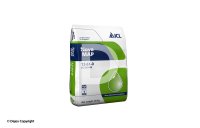![CALCIUM NITRATE G GRADE [Regulated Substance]](https://s3-eu-west-1.amazonaws.com/webshop/data/thumbs/21/211a5fbd1b3f581190493565ad0e4b61eb0e3994.jpg)
Nitrogen Fertilisers
Buy the most effective nitrogen fertilisers to boost your plant growth.
ROLE NITROGEN FERTILISERSHOW TO USE NITROGEN FERTILISERS | NITROGEN FERTILISERS BY DEJEX
Despite the fact that nitrogen is one of the most abundant elements on the planet, its deficiency is a prevalent nutritional problem in plants. It is mainly because plants are unable to obtain nitrogen from the air or the earth's crust. This is where nitrogen fertilisers can be of great help. These fertilisers suffice your setup with a pathway to natural air, ensuring seamless photosynthesis throughout your horticulture.
Role Of Nitrogen Fertilisers
Bio nitrogen, in the form of organic nitrogen fertiliser, is a non-polluting, non-chemical, and non-toxic source of nitrogen and promotes higher vegetative growth & enhances the physiological maturity of plants.
They are especially useful for young plants that are only beginning to establish themselves in the soil, to give them the best chance of good establishment in different environments.
Over the years, Dejex has been assisting commercial horticulture businesses in improving the nutrient value in their soil and plant growth. Our approach towards a cost-effective, environmentally sustainable nitrogen fertiliser makes us one of the top fertiliser sellers in the UK.
How To Use Nitrogen Fertilisers
If you've tested your soil and discovered that it's deficient in nitrogen nutrients, you have many alternatives to ensure that your plants get the aid they require. After you've decided on the best brand for your crop, you'll need to figure out how much nitrogen fertiliser you'll need based on the size of the area. All of the information necessary for this stage can be found on the fertiliser label.
For more assistance on its application, it's best to speak with a FACTs trained advisor. During the growing season, you may need to reapply fertiliser every 4 to 6 weeks, putting organic fertilisers into the top few inches of the soil or spreading chemical nitrogen products on top of the soil.
If there isn't any rain, you'll need to water the area so that the fertiliser breaks down into a usable form. However, too much nitrogen in your soil might cause problems for your plants, such as iron deficiency, which can produce yellowing leaves.
So be careful of the amount of fertiliser you add into the soil and do your homework on what's best for your soil and the plants you're growing. If you require assistance, keep in mind that the Dejex crew is always willing to assist.
Why Choose Dejex?
Having supplied organic growers for 40 years across the farms in the country, we’ve established ourselves as a one-stop shop for farmers & organisations of all forms.
From supplying nurseries to guiding you with the necessary basics of crop nutrition, our trained horticulture experts bring you all the expertise to ensure optimum nutrition & growth of your plants.
With our trusted professionals and quality products, we tend to provide our customers with all the necessary help to keep their business growing.
Come, let’s innovate horticulture with our supplies!


![MAGNESIUM NITRATE FLAKE [Regulated Substance]](https://s3-eu-west-1.amazonaws.com/webshop/data/thumbs/a3/a3fcdfade9e518908d4482ee0b7feab727a2b809.jpg)


![ANGUS SULPHATE OF AMMONIA 21% [Regulated Substance]](https://s3-eu-west-1.amazonaws.com/webshop/data/thumbs/d6/d6e4b9e5364931bca5a58ef6ae90721b7a6490e3.jpg)
![CALCIUM AMMONIUM NITRATE GRANULAR [Regulated Substance]](https://s3-eu-west-1.amazonaws.com/webshop/data/thumbs/96/96e10ffd6392e077f67b23cbe6d041609d84377d.jpg)
![CALCIUM NITRATE LIQUID [Regulated Substance]](https://s3-eu-west-1.amazonaws.com/webshop/data/thumbs/d2/d299740ba3336e7999810307b5ff50b671945b66.jpg)
![NOVATEC 18 N FLUID (AMMONIUM NITRATE LIQUID) [Regulated Substance]](https://s3-eu-west-1.amazonaws.com/webshop/data/thumbs/1c/1c6375b990b4b3829b270b27ba7298a740ad2ef0.jpg)
![NOVATEC SOLUB N-MAX 19-5-5 +2MgO+17S+TE [Regulated Substance]](https://s3-eu-west-1.amazonaws.com/webshop/data/thumbs/58/587101eb2bef772f60f4e9d384bfa6d7083d21bc.jpg)
![UNIVERSOL GREEN 23-06-10 S03+MgO+TE [Regulated Substance]](https://s3-eu-west-1.amazonaws.com/webshop/data/thumbs/36/36ef5cfff0d674a7d0edbcdaf44f3653acb0cee6.jpg)
![FLORANID N31 31-0-0 [Regulated Substance]](https://s3-eu-west-1.amazonaws.com/webshop/data/thumbs/64/645207f7f8353b7657ff5cf62abc422469506bbd.jpg)

![NOVATEC N-MAX 24-5-5+2MgO [Regulated Substance]](https://s3-eu-west-1.amazonaws.com/webshop/data/thumbs/38/3891274653342f3b8b1e1a7cbaf2c2ab781bbab8.jpg)